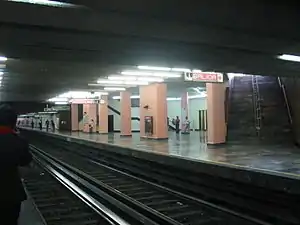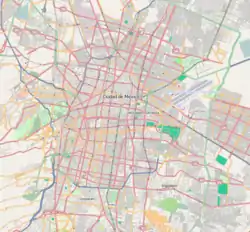San Lázaro is a station on the Mexico City Metro. It is located in the Venustiano Carranza borough of Mexico City. It lies along Lines 1 and B. The station was opened on 5 September 1969.[2] The station was designed by Félix Candela[3] and consists of interlocked hyperbolic paraboloidal or saddle roof sections. From July 2022 to October 2023, the Line 1 station was closed due to modernization works on the tunnel and the line's technical equipment.[4][5]
General information
The station logo depicts an old steam locomotive. Near the site of the metro station stood the San Lázaro mainline train station. San Lázaro was the main terminus for the Interoceanic Railway, which linked the port of Veracruz, on the Gulf of Mexico, with the Pacific Ocean. Today, some railway tracks can still be seen near the metro station, but nothing more.
Nearby is the building that houses the Chamber of Deputies ("Palacio Legislativo" in Spanish), the lower house of the Mexican Congress (Congreso de la Unión).
San Lázaro metro station is connected with TAPO, Mexico City's Eastern intercity bus station.[6] This bus station serves states including Puebla, Veracruz, Oaxaca, and Yucatán. It is used by some of the most prestigious and safest bus lines in Mexico, such as ADO, UNO, and Maya de Oro.
Nearby
- Terminal de Autobuses de Pasajeros de Oriente, bus terminal.
- Palacio Legislativo de San Lázaro, main seat of the legislative power of the Mexican government.
- Archivo General de la Nación, General Archive of the Nation.
- Palacio de Lecumberri, former prison, now housing the Archivo General de la Nación.
Exits
Line 1
- Southwest: Avenida Zaragoza and Eje 3 Oriente Ing. Eduardo Molina, Colonia 10 de mayo
- Southeast: Terminal de Autobuses de Pasajeros de Oriente, Colonia 10 de mayo
Line B
- Avenida Ing. Eduardo Molina, Colonia 7 de julio
Ridership
|
| ||||||||||||||||||||||||||||||||||||||||||||||||||||||||||||||||||||||||||||||||||||||||||||||||||||||||||||||||||||||||||||||||||||||||||||||||||||||||||||||||||||||||||||||||||||
References
- 1 2 3 4 5 6 "Afluencia de estación por línea 2022" [Station traffic per line 2022] (in Spanish). Sistema Transporte Colectivo Metro. 2023. Archived from the original on 5 March 2023. Retrieved 5 March 2023.
- ↑ Monroy, Marco. Schwandl, Robert (ed.). "Opening Dates for Mexico City's Subway". Retrieved 11 August 2011.
- ↑ "Felix Candela (1910-1997)". Structurae. Retrieved 11 August 2011.
- ↑ "La L1 del Metro de CDMX cerrará de Pantitlán a Salto del Agua, desde el 11 de julio" [Metro Line 1 Will close station 11 July from Pantitlán to Salto del Agua]. La Lista (in Spanish). 27 June 2022. Retrieved 27 June 2022.
- ↑ De la Rosa, Yared (29 October 2023). "Con 7 meses de retraso, reabren Línea 1 del Metro; sólo se podrá ingresar con tarjeta" [After a 7-month delay, Metro Line 1 reopens; access will be available with card only]. Forbes (in Spanish). Retrieved 29 October 2023.
- ↑ "Eastern intercity bus station". Archived from the original on 8 August 2011. Retrieved 6 August 2011.
- 1 2 "Afluencia de estación por línea 2021" [Station traffic per line 2021] (in Spanish). Sistema Transporte Colectivo Metro. 2022. Archived from the original on 7 March 2022. Retrieved 7 March 2022.
- 1 2 "Afluencia de estación por línea 2020" [Station traffic per line 2020] (in Spanish). Sistema Transporte Colectivo Metro. 2021. Archived from the original on 21 June 2021. Retrieved 21 June 2021.
- 1 2 "Afluencia de estación por línea 2019" [Station traffic per line 2019] (in Spanish). Sistema Transporte Colectivo Metro. 2020. Archived from the original on 8 April 2020. Retrieved 3 May 2020.
- 1 2 "Afluencia de estación por línea 2018" [Station traffic per line 2018] (in Spanish). Sistema Transporte Colectivo Metro. 2019. Archived from the original on 6 June 2019. Retrieved 7 April 2020.
- 1 2 "Afluencia de estación por línea 2017" [Station traffic per line 2017] (in Spanish). Sistema Transporte Colectivo Metro. 2019. Archived from the original on 3 May 2020. Retrieved 3 May 2020.
- 1 2 "Afluencia de estación por línea 2016" [Station traffic per line 2016] (in Spanish). Sistema Transporte Colectivo Metro. 2017. Archived from the original on 3 May 2020. Retrieved 3 May 2020.
- 1 2 "Afluencia de estación por línea 2015" [Station traffic per line 2015] (in Spanish). Sistema Transporte Colectivo Metro. 2016. Archived from the original on 3 May 2020. Retrieved 6 May 2020.
- 1 2 "Afluencia de estación por línea 2014" [Station traffic per line 2014] (in Spanish). Sistema Transporte Colectivo Metro. 2015. Archived from the original on 3 May 2020. Retrieved 6 May 2020.
- 1 2 "Afluencia de estación por línea 2013" [Station traffic per line 2013] (in Spanish). Sistema Transporte Colectivo Metro. 2014. Archived from the original on 3 May 2020. Retrieved 6 May 2020.
- 1 2 "Afluencia de estación por línea 2012" [Station traffic per line 2012] (in Spanish). Sistema Transporte Colectivo Metro. 2013. Archived from the original on 3 May 2020. Retrieved 6 May 2020.
- 1 2 "Afluencia de estación por línea 2011" [Station traffic per line 2011] (in Spanish). Sistema Transporte Colectivo Metro. 2012. Archived from the original on 7 May 2020. Retrieved 6 May 2020.
- 1 2 "Afluencia de estación por línea 2010" [Station traffic per line 2010] (in Spanish). Sistema Transporte Colectivo Metro. 2011. Archived from the original on 7 May 2020. Retrieved 6 May 2020.
External links
 Media related to San Lázaro (station) at Wikimedia Commons
Media related to San Lázaro (station) at Wikimedia Commons

